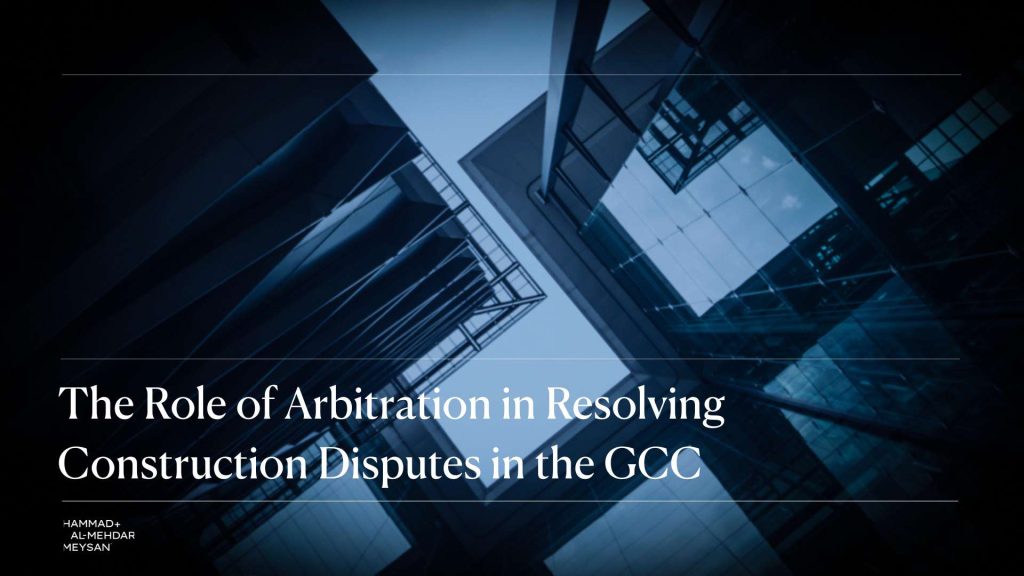
The Gulf Cooperation Council (GCC) countries continue to witness exponential infrastructure and real estate development growth, driven by national vision strategies such as Saudi Arabia’s Vision 2030 and the UAE’s Projects of the 50. These long-term transformation agendas have stimulated an unparalleled wave of construction activity, from giga-projects like NEOM and The Line in Saudi Arabia to major transit systems, ports, and digital cities across the region.
However, the scale and complexity of these projects have also led to a surge in contractual disputes. Arbitration remains the preferred dispute resolution mechanism for construction-related conflicts, offering neutrality, confidentiality, and enforcement advantages in a region where public court proceedings may lack technical expertise or risk undue delays.
Why Construction Disputes Arise in the GCC
The construction industry in the GCC is shaped by several factors that make disputes more likely:
- Diverse Stakeholders: Projects typically involve joint ventures between international contractors, regional subcontractors, consultants, and government bodies—all with different legal traditions and commercial expectations.
- Mega-Project Complexities: Many projects are technologically advanced, logistically complex, and executed over multi-year timelines, increasing the potential for cost overruns, delays, and scope changes.
- Fragmented Regulatory Environments: While culturally aligned, the GCC countries maintain distinct legal systems, complicating contract enforcement and procedural consistency.
- Labour and Material Constraints: Recent global supply chain disruptions and local Saudization and Omanisation mandates have also led to delays and cost disputes.
Arbitration as the Preferred Dispute Resolution Method
Arbitration offers numerous advantages over litigation in resolving construction disputes:
- Neutrality: Essential in international disputes, especially where a government entity is one of the parties.
- Confidentiality: Helps protect commercial reputations and proprietary information.
- Technical Expertise: Arbitrators with engineering or project finance backgrounds can better evaluate construction claims.
- Enforceability: All GCC states sign the New York Convention, facilitating cross-border recognition and enforcement of arbitral awards.
- Procedural Flexibility: Parties can agree on rules, venues, languages, and laws governing the proceedings.
Recent Developments in GCC Arbitration
Saudi Arabia
In 2023, the Saudi Centre for Commercial Arbitration (SCCA) introduced an updated Fast Track Procedure, which enabled the resolution of smaller claims within six months.
A 2024 Ministerial Circular clarified that government entities can refer disputes to arbitration without Royal Decree if contracts are governed by international law—a significant shift that enables more foreign participation.
Vision 2030 projects like the Red Sea Global and Diriyah Gate have embedded SCCA clauses as standard in EPC contracts.
United Arab Emirates
The Dubai International Arbitration Centre (DIAC) completed its consolidation with the Emirates Maritime Arbitration Centre (EMAC) in 2023, simplifying institutional offerings.
The 2023 DIAC Rules now allow emergency arbitrator provisions and broader interim measures.
The ADGM Arbitration Centre continues to gain popularity for high-value disputes, bolstered by common law jurisdiction and enforceability via the ADGM Courts.
Qatar
In 2024, the Qatar International Centre for Conciliation and Arbitration (QICCA) launched a Construction Disputes Board mechanism to support large-scale World Cup legacy infrastructure projects.
New model clauses align QICCA arbitration with FIDIC Red and Silver Book formats.
Oman, Bahrain, and Kuwait
Oman introduced the Construction Claims Tribunal (CCT) in 2023. This hybrid forum combines adjudication and arbitration features, particularly useful for OMR 10M+ projects.
Bahrain’s BCDR has led in digital arbitration, using AI-assisted document review in complex cases since 2024.
Kuwait has increased court enforcement cooperation with the Kuwait Commercial Arbitration Centre (KCAC), reducing execution time for domestic awards by 40%.
Common Challenges and Risks in Construction Arbitration
Despite its benefits, arbitration in the GCC faces certain hurdles:
- Cost Concerns: High fees and legal expenses deter SME contractors from pursuing arbitration.
- Duration Drift: Complex claims often lead to prolonged timelines despite institutional fast-track options.
- Enforcement Uncertainty: While awards are enforceable under the New York Convention, execution can be delayed due to administrative hurdles in local courts.
- Cultural Dynamics: Informal dispute resolution (e.g. majlis-style mediation) remains preferred in some jurisdictions, particularly for low-value claims.
To mitigate disputes and ensure effective arbitration outcomes, construction firms should consider the following:
- Draft Robust Arbitration Clauses: Align with institutional rules (e.g., DIAC, SCCA) and clearly specify governing law and venue.
- Incorporate Multi-Tier Dispute Resolution: Start with mediation or dispute adjudication boards before escalating to arbitration.
- Appoint Experienced Arbitrators: Choose professionals with sector-specific expertise and prior regional experience.
- Plan for Enforcement: Identify jurisdictions with effective enforcement mechanisms at the contract stage.
- Monitor Legal Updates: Stay informed of new arbitration laws, institutional reforms, and court interpretations.
Outlook: Arbitration as a Pillar of GCC Infrastructure Growth
As the GCC continues to attract billions in FDI and deliver mega-infrastructure projects, arbitration will remain a vital tool for managing risk and preserving relationships. Institutional reforms, technology integration, and alignment with global best practices are expected to streamline dispute resolution further and enhance investor confidence.
In 2025 and beyond, arbitration’s role will no longer be reactive—it will be an embedded part of strategic project planning, governance, and contract design. Investing in dispute avoidance and effective arbitration practices is essential to long-term success for construction firms, legal counsel, and government agencies.
